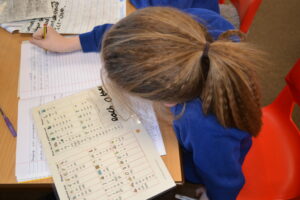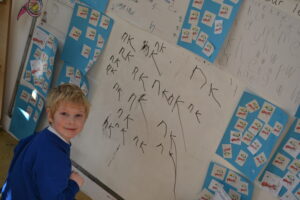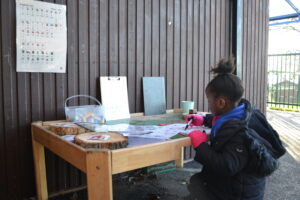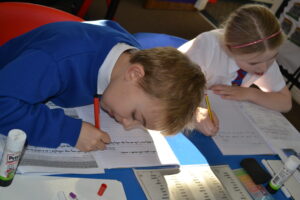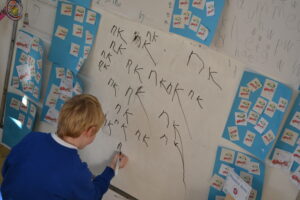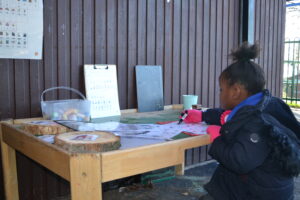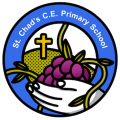Writing
Intent
At St Chad’s C.E. Primary School we believe that writing is a key skill for life and that is why it features across all the subjects taught in our school. Our aim is to provide children with key transferrable writing skills that are built on year on year, preparing them for life beyond primary school.
We intend to create confident writers who develop a love for writing throughout school. We aim for all our children to be independent writers, building on a range of skills as they work through each unit of writing. We want all children to reach their full potential and to feel confident in their individual ability to be successful writers.
Above all we want our pupils to be excited to get writing!
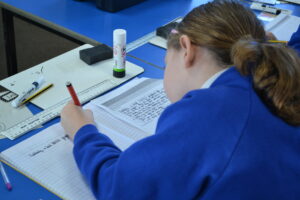 In keeping with our ethos of no child left behind, we have adopted a mastery approach to writing following The Literacy Company’s ‘Pathway to Write’ programme. Units of work are delivered using high quality texts and children in all year groups are given varied opportunities for writing. Skills are built up through repetition within the units, and children apply these skills in the writing activities provided. Many opportunities for widening children’s vocabulary are given through the ‘Pathways to Write’ approach and this builds on the extensive work we do in school to provide our children with a rich and varied vocabulary.
In keeping with our ethos of no child left behind, we have adopted a mastery approach to writing following The Literacy Company’s ‘Pathway to Write’ programme. Units of work are delivered using high quality texts and children in all year groups are given varied opportunities for writing. Skills are built up through repetition within the units, and children apply these skills in the writing activities provided. Many opportunities for widening children’s vocabulary are given through the ‘Pathways to Write’ approach and this builds on the extensive work we do in school to provide our children with a rich and varied vocabulary.
Our children’s writing journey begins in the Early Years department, where children begin with giving meaning to their mark making. Writing opportunities are provided throughout the provision to encourage children to become independent writers right from the start. The ‘Pathways to Write’ units begin in nursery, where children are exposed to high quality texts as soon as they enter our school, ensuring they are excited to write right from the very start of their education.
We follow the mixed aged planning for Early Years and KS2, which allows the children to access the same quality text, but they are taught the key writing skills for their year group to ensure progression is maintained. In KS1 the children are taught in single year group classes, so there isn’t currently a need for mixed aged planning. Each unit of work lasts for approximately one half term and comprises of three components.
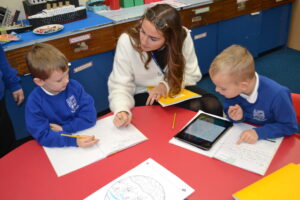 1) Gateway:
1) Gateway:
This is an opportunity to hook the pupils into the context of learning and to assess previously taught mastery skills (writing objectives). A short writing task is set to assess the application of Gateway skills. This ‘Gateway Write’ allows us to assess the previous learning so we can adapt the planning to suit the needs of our children for more personalised learning, or to target individual pupils with gaps in prior learning.
2) Pathway:
In this section, the Mastery skills (new learning objectives) are introduced with many opportunities along the way to practise and apply these skills in different writing tasks. The tasks use genres that the pupils will be familiar with such as character or setting descriptions, dialogue, diary entries, instructions, poetry and sentence work, providing a range of on-going evidence for writing assessment. The progression within genres as you move through school is also built into the scheme, this is referred to as ‘Feature Keys’.
3) Writeway:
This final section of the sequence comprises of an extended writing opportunity. It begins with sectioning and sequencing texts using a model, before the children are given the opportunity to write at length, independently. Within the Writeaway, pupils are encouraged to plan, write, check, edit, re-draft and publish as required; with the focus on using and applying the mastery skills they have been taught.
The teaching of grammar throughout school is incorporated within the English lessons. Each writing lesson begins with a quick retrieval practice activity where children recall previously taught grammar skills to ensure this learning becomes embedded and not forgotten.
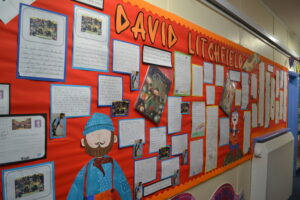 Our most able writers are challenged through open ended writing activities, to ensure ownership of their writing and flourish as authors. Pupils requiring further support with their writing are still exposed to the same learning as their peers, but are scaffolded to achieve the same, or very similar writing outcomes. ‘Pathways to Write’ provides a clear progression document that allows staff to track back to where a writing skill begins, so lessons objectives can be adapted. In order to create opportunities for children to catch up with their age-related expectations, we have invested heavily into the ‘Pathways to Progress’ writing intervention, which plans detailed sessions for each year group, relating to the units in class. This intervention makes the learning outside of the classroom transferable back to the English lessons. The programme also delivers high quality CPD for our teachers and staff delivering the sessions.
Our most able writers are challenged through open ended writing activities, to ensure ownership of their writing and flourish as authors. Pupils requiring further support with their writing are still exposed to the same learning as their peers, but are scaffolded to achieve the same, or very similar writing outcomes. ‘Pathways to Write’ provides a clear progression document that allows staff to track back to where a writing skill begins, so lessons objectives can be adapted. In order to create opportunities for children to catch up with their age-related expectations, we have invested heavily into the ‘Pathways to Progress’ writing intervention, which plans detailed sessions for each year group, relating to the units in class. This intervention makes the learning outside of the classroom transferable back to the English lessons. The programme also delivers high quality CPD for our teachers and staff delivering the sessions.
Alongside the key writing skills, ‘Pathways to Write’ builds in extensive opportunities to develop and apply vocabulary. Each unit contains a vocabulary box, containing tier 2 and 3 words to teach, share and display. There are also planned opportunities to include the National Curriculum word lists and Common Exception Words across KS1 and KS2.
Our children are eager to write and enjoy their writing lessons. They are fully immersed in the inspiring texts and this shows in their willingness to write. Children in the Early Years are now asking to write and to do the adult led written activities. They are approaching visiting adults to tell them all about the ‘ants on the loose’. This eagerness and love for writing continues into KS1 and KS2.
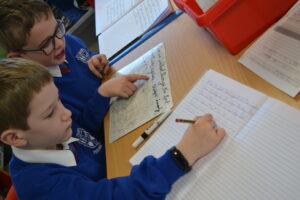 In KS1 pupils are keen to write about the characters they have read about, or to create wanted posters for ‘Nibbles’ who keeps eating their books! Our children tell us that their teachers “are enthusiastic about the book” and “they love teaching us English”. Children are excited to publish their work at the end of the units and they can tell us how the gateway, mastery and feature keys support their writing process. They know how to make use of the working wall and where to find vocabulary to support their writing. Our pupils are proud of their work and tell us “they have never written this much before”. Our teachers are also excited to teach writing and it has transformed their planning and delivery of writing lessons. They tell us that “they’ve never seen children so eager to write before.”
In KS1 pupils are keen to write about the characters they have read about, or to create wanted posters for ‘Nibbles’ who keeps eating their books! Our children tell us that their teachers “are enthusiastic about the book” and “they love teaching us English”. Children are excited to publish their work at the end of the units and they can tell us how the gateway, mastery and feature keys support their writing process. They know how to make use of the working wall and where to find vocabulary to support their writing. Our pupils are proud of their work and tell us “they have never written this much before”. Our teachers are also excited to teach writing and it has transformed their planning and delivery of writing lessons. They tell us that “they’ve never seen children so eager to write before.”
Our children know what a successful piece of writing looks like. They can select carefully chosen vocabulary, discuss the writing skills they have used and have a secure knowledge of grammar. Our children all know they can be successful in writing and leave us as confident writers
Gallery
